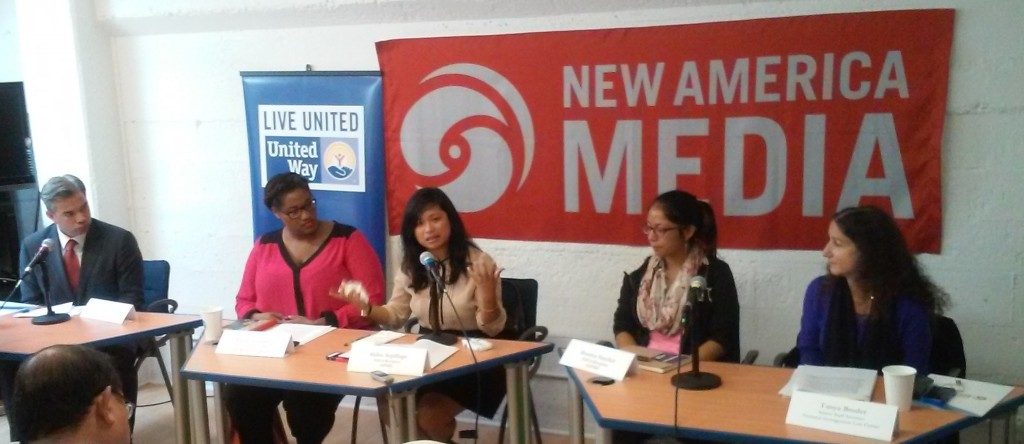
California Assembly Member Rob Bonta (left), Nicole Saulsberry, Akiko Aspillaga and Beatrice Sanchez at New America Media newsmaker briefing in San Francisco. PHOTO BY JUN NUCUM
SAN FRANCISCO — The lone Filipino-American member the California State Assembly vowed to push for legislation that would provide health care coverage for all Californians regardless of immigration status.
If passed, the law would benefit an estimated two million undocumented immigrants in California including thousands of the 1.2 million Filipinos in the state.
Assembly Member Rob Bonta, buoyed by the huge enrollment figures in the state for the new Affordable Care Act, promised to push for the passage of Senate Bill 1005, authored by Senator Ricardo Lara, that would give undocumented immigrants access to coverage.
Unfortunately, their efforts have the bill passed this year stalled, even after it passed the policy committee.
Bonta was the keynote speaker at a recent New America Media special newsmaker briefing titled “A Report Card on Health Care Reform: Who’s Covered, Who Isn’t, What’s Next?”
“The senate bill was held in the appropriations committee where discussions, debate and questions about how it would be paid for were raised,” rued Bonta. “The legislative process is over for this year, the bill will not be signed this year.”
Sons of immigrants
Proponents of the bill also have to contend with the firm belief of some people that undocumented immigrants do not deserve to benefit from services because they are in the United States illegally.
Both Bonta and bill author Senator Lara are sons of immigrants and strong supporters of the undocumented and known for working for health care coverage for as many Californians as possible.
Since budget considerations were the main reasons for the bill’s rough sailing in the legislature, Bonta explained that investment in the less costly front end of the health care system particularly in wellness and prevention programs, could actually lessen the pressure on health care spending as a whole.
“Estimates show that we spend around $1.3 billion on undocumented Californians,” he said, “but we would spend in the range of $350-460 million if we provided health coverage as well as wellness and preventative care. If you are diagnosed, treated and managed early enough (then you) avoid the costly trips to the hospital.”
Not much more costly
Tanya Broder, a senior staff attorney at the National Immigration Law Center, echoed Bonta’s argument. “The University of California in both Los Angeles and Berkeley has determined that it won’t cost too much even to extend Medi-Cal coverage.”
“Results show that it would only cost two cents extra on a Medi-Cal dollar to get a full coverage in California for everyone. It is not too much to spend for something that will help all of us,” Broder stated.
Bonta said he and the bill’s supporters have to satisfy Gov. Jerry Brown’s and their legislative colleagues’ on how to pay for the cost of covering everyone, including the undocumented. “We need to do our best to accommodate their concerns without diluting the importance of this bill, Bonta acknowledged.”
Meanwhile, before the bill is passed, undocumented immigrants and their families’ medical needs will have suffer through lack of coverage.
Broder reported that because of the Affordable Care Act, additional 3.1 million people have received coverage in California. “However, half of the 2.7 to 3.4 million of the remaining uninsured are ineligible because of their immigration status.”
Undocumented and uninsured
Such is the plight of Deferred Action for Childhood Arrivals (DACA) recipients Beatrice Sanchez and summa cum laude nursing graduate Akiko Aspillaga, a Filipina, who were brave enough to share their experiences of being undocumented and uninsured.
President Barack Obama ordered that action on deportation be deferred for undocumented children who were under 31 years of age as of June 15, 2012, came to the U.S. while under the age of 16 and have continuously resided here from June 15, 2007 to the present, among other stipulations.
DACA recipients are allowed to work, may apply for a driver’s license and are eligible for Medi-Cal. Until recently, however, an estimated 20,000 of about 37,000 (54 percent) potential DACA recipients are Filipinos who have not availed of the program.
Sanchez, who had been afraid to see a doctor since a school accident at the age of seven for fear of steep medical bills. She also endures her mother’s lack of medical benefits. “My mom continued to work hard while fast developing diabetes that had gone worse until she fell into a coma,” Sanchez recalled.
Aspillaga’s mom, on the hand, had to take over the counter pain relievers to temporarily ease whatever pain she feels. She told of her mother’s desperation:
“Anak (My child), if I die, sell all my jewelry, my possessions so you can bury me without debt. But anak, if I go to the hospital I will bury you in debt.”
RELATED STORIES
New fees on remittances to help fund California health care expansion?
Health care for California minorities often lost for lack of translation

